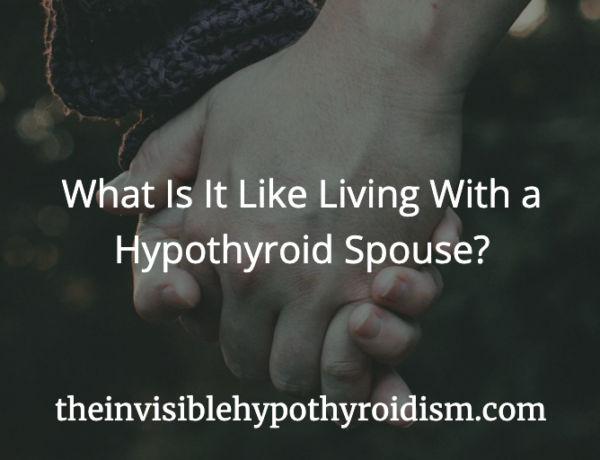TW: Mental Health, Body Image, Disordered Eating
This is a guest post, written by thyroid patient Hedi.
Hedi promotes body positivity and, like myself, feels that this is incredibly important to share among fellow thyroid patients struggling with changes to their weight.
Written by Hedi, Thyroid Patient.
Why You Shouldn’t Focus on Your Weight
I come across so many hypothyroidism sufferers, mostly women, who seem to care little about the fact that they’re very ill: all they seem to think about is their weight! It’s still quite shocking to me that we’re so conditioned into putting our looks before our general health, and that we seem blind as to what it is that our bodies actually need. Hint: when you suffer from hypothyroidism, and possibly adrenal issues and other disruptions to your endocrine system, crash dieting and overexercising isn’t the solution! I recommend anyone who suffers with problems about their body image, but especially those who are hypothyroid, to stop focusing on their weight and to become more body positive.
Weight Gain is a Symptom
Weight gain, the inexplicable fluctuations in weight, and the inability to lose weight are very common symptoms of hypothyroidism. I keep emphasising the fact that it is a symptom, a sign that something else in the body is not working the way it should be, and all the miracle diets, vigorous exercise plans, and weight loss products in the world are not going to give you the results that you crave.
Besides that, you have bigger fish to fry: forget about weight, you are sick!
The obsession with weight is understandable, because most of us live in a culture where there seems to be a direct correlation between thinness and beauty, and how much value a woman thinks she has.
If you feel sluggish, depressed, and exhausted all day long, and not able to control your weight on top of that, no matter how hard you try, it is understandable that it may be one of the first things you focus on, because besides the messages you’ve been getting about your value as a person since a very young age, it is also staring you right in the face every day when you look into the mirror.
Unlike fatigue and depression, it is a visible symptom, and although they should know better: it’s something others tend to comment on. It’s not difficult to understand that it is not uncommon for people who suffer from hypothyroidism to develop an eating disorder.
Body Positivity
So what does it mean to be body positive? Personally, I’m so much happier since I let go of the idea that I’m a failure for not being the same size I used to be before having hypothyroidism.
Bodies come in all shapes, colours, and sizes, and that’s normal and perfectly fine! I understand that it can be difficult to not panic when you see your body change due to this illness, but remember that we are all going through it. Your body can and will fluctuate in weight, it’s natural.
Your body will not be able to let go of excess weight until you are on your optimal dose of thyroid medication, the type that works for you personally, until your whole endocrine system finds its balance again, and any possible vitamin deficiencies and adrenal issues are addressed.
Dieting and over exercising will only make things worse. When you give your body a chance to heal, and make this your priority and allow yourself enough time, the weight that you initially gained from being hypothyroid will likely come off. How much time you need is different for everyone, and it may depend on how long you have been (unknowingly) struggling with thyroid issues already.
It’s a Trap
We’re all bombarded by advertisements every single day, and most of the time we are quite good at ignoring them. However, there is a certain category of advertisers that makes money by telling people that they are not good enough, that they are ugly, and that they need to lose weight.
Weight loss products, especially pyramid scheme-type sellers, prey on those with hypothyroidism, because a lot of us become desperate. Not being able to lose weight at all, no matter how little we eat or how much we exercise, makes us want to believe and try anything. Remember that there are no quick fixes. The road to recovery is long for most people, and it takes work and patience. A fad diet or powdered shake is not going to magically heal your thyroid overnight and help you shed pounds.
Even if you are able to lose some weight in an unhealthy way, think of the damage that you are doing. You are possibly making your body, and therefore your thyroid, even weaker!
Guess what’s going to happen when you run out of supplement X or stop following crash diet Z to the letter? You guessed it: more weight gain. Don’t fall for these traps.
Advertisements or people who approach you with a ‘miracle’ product are not trying to help you. They are trying to make money off your illness. If meal replacement Y was so great, they would be selling it in every single shop right now. Heck, your endocrinologist would be recommending it to you!
Do:
- Find a doctor who takes you seriously and helps you find a treatment plan that works for you. Don’t be afraid to visit multiple doctors. Visiting a holistic doctor next to that endocrinologist you like can be really helpful.
- Get regular blood tests to monitor your thyroid levels. Check if you suffer from any deficiencies or other imbalances.
- Ditch whatever works for you: ditch gluten, ditch refined sugar, ditch dairy, ditch processed foods, but do not ditch the calories! Find out what make you good or bad, which diet to follow, but keep nourishing your body with ample fresh fruits and vegetables. A hungry body can’t heal.
- Exercise if your body allows you to. They say half an hour of exercise a day makes a difference for your health. So move, if you comfortably can. Do you enjoy going for a run, playing tennis, or an hour at the gym? That’s great! But remember, it’s not about pushing yourself. Yoga, walking, or swimming are just as good for what we’re trying to achieve here. Do what works for you! Don’t compare yourself to others.
- Start following some body positive celebrities on Instagram and Facebook. Trust me, actually seeing different body shapes from the one shape that you are bombarded with all day every day by the media makes a big difference in accepting your own body shape. Plus-size people are beautiful too.
- Get help from a professional if your body image stops you from functioning normally. Eating disorders and body dysmorphic disorders are very real. Hypothyroidism affects brain function and makes us more susceptible to psychological disorders.
Don’t:
- Count calories, unless you tend to eat too little and need to make sure you eat enough.
- Fall for fad diets. They generally do not accomplish any lasting changes. Only make changes to your diet that you can keep up for the rest of your life. Also, don’t be too strict, because it won’t last. Allow yourself a treat.
- Forget that miracles don’t exist. Remember that healing takes time and work, there are no quick fixes!
- Compare yourself to others. Yes, that person you know who also suffers from hypothyroidism may have lost a lot of weight by following this or that diet. You are you, though, and every body is different. What works for another person, or how long it takes another person to heal or feel better on medication has nothing to do with you.
- Don’t think that you are not beautiful, valuable and important, because you are.
- Don’t despair. Take control of your own health and you will feel better.
Embrace those belly rolls!
Hedi, Thyroid Patient.
If you would like to submit a guest post, whether you’re a thyroid patient, doctor or anyone else, please get in contact.
What are your thoughts on this topic? Feel free to add to the comments section below.
You can click on the hyperlinks in the above post to learn more and see references to information given.





